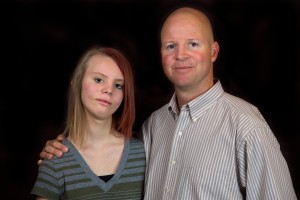
Ultragenyx Pharmaceutical Inc., a biopharmaceutical company focused on the development of novel products for rare and ultra-rare diseases, and Saint Louis University’s (SLU) Center for World Health and Medicine, announced that they have entered into three-year agreement to collaborate on the development of small molecule therapeutics for the potential treatment of Facioscapulohumeral Muscular Dystrophy (FSHD).
The SLU team is led by Fran Sverdrup, PhD, whose lab has been supported through a grant from the FSH Society (“BET Proteins as Therapeutic Targets in FSHD,” awarded $51,425 from February 2014 cycle).
Sverdrup decided to go into the field when his daughter was diagnosed with infantile FSHD (see FSH Watch Winter 2012). “By combining our Center’s drug development capabilities with the rare disease expertise of Ultragenyx, this collaboration may increase the chances and accelerate the process of delivering an effective therapy to patients with FSHD,” said Pete Ruminski, executive director for SLU’s Center for World Health and Medicine. “The fact that our own scientist’s daughter has FSHD provides extra motivation and passion to our team’s efforts to find a therapy to treat her and all those with the disease.”
Under the Ultragenyx agreement, Sverdrup’s team will identify and conduct preclinical research of small molecules for the potential treatment of FSHD. Ultragenyx, based in Novato, California, has an exclusive option to an exclusive license to existing and future intellectual property arising from the collaboration.
Read more: Via Nasdaq: Ultragenyx and Saint Louis University’s Center for World Health and Medicine Announce Research Collaboration to Advance Muscular Dystrophy Treatment


The muscle fibers and their movements are vital sign of life. Muscles receive signal from nerve which itself receive signals from deep within (mind). For an effective treatment we need a molecule which provide protection to this whole neuro-muscular apparatus. Medicinally important molecules such as Curcumin, withanolides and boswellic acid may interest researchers in their quest to find efficient and affordable treatment of FSHD.
My daughter has FSH and her son, much more severe. I pray everyday that a cure will come soon. She was diagnosed at age 8 and her son right after birth. Thank you to those working so hard to find a cure.
Thank you all so much. This is so important to me and my family. 🙁